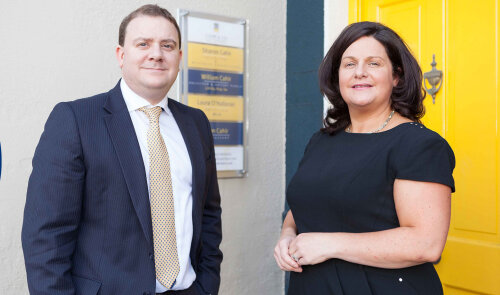Best Personal Injury Lawyers in Ennis
Share your needs with us, get contacted by law firms.
Free. Takes 2 min.
List of the best lawyers in Ennis, Ireland
About Personal Injury Law in Ennis, Ireland
Personal injury law covers claims for compensation where someone suffers physical injury, illness or psychological harm because of another person or organisation's negligence or wrongdoing. In Ennis - the county town of County Clare - residents pursue the same statutory and common-law rights as elsewhere in the Republic of Ireland. Common claim types include road-traffic accidents, workplace injuries, slips and trips in public places or shops, medical negligence, product defects and assault-related injuries.
The Injuries Board - a national body - plays a central role in most personal injury claims across Ireland. Local solicitors based in Ennis can guide claimants through the Injuries Board process, negotiations with insurers and, if necessary, court proceedings in the appropriate jurisdiction. This guide explains key steps, local considerations and practical advice for someone seeking legal help in Ennis.
Why You May Need a Lawyer
Many people can benefit from legal advice after a personal injury. A lawyer helps to protect your legal rights, preserve important evidence and maximise the chance of a fair outcome. You may need a lawyer if:
- Your injuries are significant, ongoing or require long-term care and rehabilitation.
- Liability is disputed or multiple parties may be responsible - for example a road collision involving several drivers or a workplace accident involving subcontractors.
- You have suffered psychological injury or a complex medical condition that is hard to link to the incident.
- You are dealing with insurers who deny liability or make low settlement offers.
- The case involves clinical negligence, complex statutory rules or significant legal technicalities.
- You prefer an experienced professional to handle negotiations, applications to the Injuries Board and court procedure so you can focus on recovery.
Local Laws Overview
Key legal features that matter for personal injury claims in Ennis and across Ireland include the following.
- Limitation period - In general you have two years to start a personal injury claim. This period usually runs from the date of the injury or from the date you became aware that the injury was linked to someone else’s actions. There are exceptions for minors and certain types of claims, so it is important to get legal advice as soon as possible.
- Injuries Board (Personal Injuries Assessment Board) - Before issuing court proceedings in most personal injury matters you must make a formal claim to the Injuries Board. The Board assesses the claim and issues an assessment of compensation. Parties can accept the assessment and settle, or reject it and proceed to court. The Injuries Board process is mandatory in many cases, with some limited statutory exemptions.
- Court options - If the Injuries Board process does not resolve the matter, claims may proceed to court. Small-value claims are often dealt with in the District Court, while larger or more complex claims are heard in the Circuit Court or High Court depending on the value and complexity.
- Burden of proof and negligence - Personal injury claims are usually grounded in negligence. The claimant must show that the defendant owed a duty of care, breached that duty, and that the breach caused the injury and loss. Evidence - medical records, witness statements and expert reports - is critical to establish causation and loss.
- Medical evidence and care - Documenting medical assessment and treatment is vital. A clear medical record links the injury to the incident and helps quantify damages for pain and suffering, loss of earnings and future care needs.
- Costs and fees - Legal costs include solicitor fees, counsel fees, expert reports and court expenses. Many solicitors offer a range of fee arrangements - for example conditional fee agreements sometimes described as no-win-no-fee - but each arrangement has legal and procedural requirements and potential costs. Always get clear written terms.
Frequently Asked Questions
How long do I have to bring a personal injury claim?
In most cases you must start your claim within two years of the date of injury or the date you knew the injury was connected to the incident. There are special rules for minors - the two-year period usually begins when the child turns 18 - and for certain other circumstances. Because time limits can bar claims, seek advice promptly.
Do I have to make a claim to the Injuries Board first?
For most personal injury claims in Ireland you must make a formal application to the Injuries Board before issuing court proceedings. The Board assesses the claim and issues an assessment that the parties can accept or reject. Some cases are exempt from the Injuries Board process - for example where an international element applies or where the claim falls outside the Board’s remit. A solicitor can confirm whether your case must go to the Board.
What information and documents should I collect after an accident?
Preserve evidence as soon as you can. Key items include medical records and hospital reports, photographs of the scene and injuries, witness names and contact details, a copy of any accident or incident report, receipts for expenses, employer or Garda reports if applicable, and any correspondence from insurers. Write a dated note of how the incident occurred while your memory is fresh.
Can I speak to the other party’s insurer directly?
You can speak to an insurer, but be cautious. Do not admit liability or make definitive statements about your injuries before getting legal advice. Insurers may try to settle quickly for less than the full value of your claim. Informing your own solicitor early gives you professional support during communications and negotiations.
How much compensation can I expect?
Compensation depends on the type and severity of injuries, the effect on your life and work, medical and rehabilitation costs, and future care needs. Awards for pain and suffering - known as general damages - and financial losses - known as special damages - are assessed case by case. The Injuries Board and experienced solicitors can provide estimates based on comparable cases but exact amounts vary widely.
How long will my case take to settle?
Timelines vary. A straightforward claim might settle within months, while complex cases with disputed liability or significant injuries can take years, especially if they go to court. The Injuries Board process has its own timelines, and court proceedings add time. Your solicitor can give a realistic estimate once the key facts and medical evidence are known.
Can I use a local Ennis solicitor or do I need a specialist from a larger city?
Local Ennis solicitors often handle a wide range of personal injury matters and can advise on local procedures, medical providers and court venues. For particularly complex clinical negligence or catastrophic injury claims you may work with a solicitor who has specialist expertise and experience in higher courts. Choose a solicitor with relevant experience and clear communication.
What if I was partly at fault for the accident?
Partial fault does not necessarily prevent recovery. Under the law you can still recover damages, but your award may be reduced to reflect your share of responsibility - this is called contributory negligence. The reduction depends on the degree of fault assigned by the tribunal or court.
Do I have to pay legal fees if I lose?
Fee arrangements vary. Conditional fee agreements - sometimes called no-win-no-fee - are common in personal injury cases, but they are not identical across solicitors and may include a success fee if you win. If your case goes to court and you lose, you may still be responsible for certain costs and outlays. Always get written terms explaining fees, disbursements and potential cost risks before instructing a solicitor.
Can children or elderly relatives claim compensation?
Yes. Children can bring claims for injuries they suffer, but limitation periods and procedural safeguards apply - often a parent or guardian conducts the claim as a next friend until the child reaches adulthood, or the court can appoint a guardian ad litem. For elderly or vulnerable people, a guardian or appointed representative may handle the case. Legal advice is important to ensure proper procedure and protection of any settlement funds.
Additional Resources
Useful organisations and bodies you can contact for information or assistance include:
- Injuries Board - the national body that assesses many personal injury claims.
- Courts Service of Ireland - information on court types, procedures and venues.
- Citizens Information - free information on rights, procedures and public services.
- Law Society of Ireland - professional body for solicitors and a directory to find solicitors by area or specialty.
- Legal Aid Board - information about eligibility for state-funded legal services.
- Bar of Ireland - professional body for barristers and guidance on finding specialist counsel.
- Road Safety Authority - information and statistics relevant to road traffic incidents.
- Health Service Executive - medical services and supports following injury.
- Garda Siochana - local police who may prepare reports and records relevant to accidents or assaults.
- Clare County Council or local Citizens Information Centre - local assistance and support services in the Ennis area.
Next Steps
If you have suffered a personal injury and need legal assistance in Ennis, consider the following steps:
- Seek medical care immediately - your health is the priority and medical records will support any claim.
- Preserve evidence - photographs, witness details, accident reports and receipts for expenses.
- Contact a solicitor for an initial consultation - many personal injury solicitors offer a free or low-cost initial meeting to assess your case and explain options.
- Ask about fee arrangements - get clear written terms on fees, conditional fee agreements and potential outlays so you understand cost risks.
- Consider referring your claim to the Injuries Board where required - your solicitor can prepare and submit the application and advise on the assessment outcome.
- Keep a record of how the injury affects your daily life, work and activities - short dated notes can be persuasive evidence of impact.
- Do not admit fault - be cautious in communications and refer insurers or other parties to your solicitor.
- If you need help finding a solicitor in Ennis, contact the Law Society or local Citizens Information for referrals and checks on credentials.
Finally, remember this guide provides general information and is not a substitute for legal advice. For advice tailored to your situation contact a qualified solicitor promptly to protect your rights and preserve important time limits.
Lawzana helps you find the best lawyers and law firms in Ennis through a curated and pre-screened list of qualified legal professionals. Our platform offers rankings and detailed profiles of attorneys and law firms, allowing you to compare based on practice areas, including Personal Injury, experience, and client feedback.
Each profile includes a description of the firm's areas of practice, client reviews, team members and partners, year of establishment, spoken languages, office locations, contact information, social media presence, and any published articles or resources. Most firms on our platform speak English and are experienced in both local and international legal matters.
Get a quote from top-rated law firms in Ennis, Ireland — quickly, securely, and without unnecessary hassle.
Disclaimer:
The information provided on this page is for general informational purposes only and does not constitute legal advice. While we strive to ensure the accuracy and relevance of the content, legal information may change over time, and interpretations of the law can vary. You should always consult with a qualified legal professional for advice specific to your situation.
We disclaim all liability for actions taken or not taken based on the content of this page. If you believe any information is incorrect or outdated, please contact us, and we will review and update it where appropriate.










